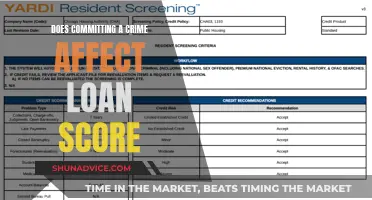
Non-US citizens may find it challenging to secure personal loans, but it is not impossible. There are specific lenders that specialize in personal loans for immigrants, and some organizations provide low-interest loans to cover application fees for citizenship. The eligibility requirements and application processes vary among lenders, and some may require a co-signer with good credit. Citizenship loans are also available to cover the costs associated with the immigration process, including fees and legal costs.
| Characteristics | Values |
|---|---|
| Interest Rate | 1% |
| Loan Amount | Up to $1,000 or $4,000 depending on the lender |
| Eligibility | Non-citizens with no prior credit history |
| Repayment Period | 1 year |
| Application Process | Online or in-person |
| Lenders | One Percent for America (OPA), Resource One Credit Union, LendingTree |
| Requirements | Name, address, email, checking account information, Social Security or ITIN number |
What You'll Learn

Citizenship loans are available for non-US citizens
One example of a lender offering citizenship loans is Resource One Credit Union. They offer two tiers of citizenship loans: the Getting Started Loan, which provides up to $1,000, and the standard Citizenship Loan, which offers up to $4,000. These loans are available to anyone who lives or works in certain areas of Texas, including Mesquite, Garland, Carrollton, Spring, Irving, Cedar Hill, Jersey Village, Oak Forest, Dallas, Houston, and Northwest Harris Counties. No prior credit history is required for these loans, and members can use their ITIN instead of a social security number.
Another option for non-US citizens seeking citizenship loans is One Percent for America (OPA). OPA offers 1% interest loans to cover USCIS application fees for qualified non-citizen residents. However, residents of certain states are not eligible for these loans. OPA loans must be repaid within one year and can only be used for paper applications, not online applications.
In addition to credit unions and specialized lenders, non-US citizens may also consider other options for financing their path to citizenship. These include borrowing from family or friends, seeking assistance from local community organizations or nonprofit groups, or joining a lending circle. It may also be easier for non-citizens to obtain a personal loan with a cosigner, preferably a US citizen with good credit.
To apply for a citizenship loan, individuals will typically need to meet certain criteria, such as being 18 years or older, providing proof of identity and income, and having a US-based address. Some lenders may also require a social security number or ITIN for credit checks. It is important to carefully review the eligibility requirements and loan terms before applying.
CIT Commercial Loans: What You Need to Know
You may want to see also

Citizenship loans can be used to cover fees and legal costs
There are various lenders that offer citizenship loans, such as One Percent for America (OPA) and Resource One Credit Union (R1CU). OPA provides low-interest loans of 1% specifically for USCIS application fees. This loan is intended for qualified non-citizen residents who plan to submit a paper application by mail. It's important to note that OPA is not currently accepting new applications. Additionally, residents of certain states, including Arizona, Georgia, and Washington, are not eligible for OPA loans.
R1CU offers two tiers of Citizenship Loans to provide flexibility for different situations. The "Getting Started Loan" offers up to $1,000 to help individuals cover the costs of citizenship, including fees and legal expenses. Their second tier provides loans of up to $4,000, catering to those seeking citizenship for multiple people or an entire family. R1CU also allows borrowers to use their ITIN (Individual Taxpayer Identification Number) instead of a social security number.
Citizenship loans are typically similar to personal loans, with funds provided upfront and repaid over a specified term. However, it's important to understand the terms and conditions of these loans, as some lenders impose restrictions on the use of the loaned funds. For example, OPA loans must be used solely for USCIS paper application fees and cannot be used for any other purpose or online applications. Failure to comply with these restrictions may result in check fraud.
When considering a citizenship loan, it's advisable to explore multiple options and compare interest rates, eligibility requirements, and repayment terms. While some lenders may offer low-interest loans, others, such as payday lenders, are known for charging extremely high-interest rates. By understanding the costs and choosing a suitable loan, individuals can make informed decisions about financing their path to citizenship.
Chase Loan Modification: What You Need to Know
You may want to see also

Some lenders offer low-interest rates
While it can be challenging for non-US citizens to secure personal loans, some lenders do offer low-interest rates for citizenship loans. These loans are designed to help finance the path to US citizenship, covering costs such as USCIS application fees, legal fees, and other associated expenses.
One example of a lender offering low-interest rates for citizenship loans is One Percent for America (OPA). OPA provides 1% interest loans to qualified non-citizen residents planning to submit a paper application to the USCIS. This loan is currently unavailable to residents of several states, including Arizona, Georgia, Hawaii, Idaho, Louisiana, Mississippi, Missouri, Nevada, New Mexico, North Dakota, Oklahoma, Oregon, Utah, Washington, West Virginia, and Wisconsin.
Resource One Credit Union is another lender that offers Citizenship Loans to anyone who lives or works in specific areas of Texas, including Mesquite, Garland, Carrollton, Spring, Irving, Cedar Hill, Jersey Village, Oak Forest, Dallas, Houston, and Northwest Harris Counties. Their maximum loan amount is $4,000, which can be used to cover fees and legal costs for individuals or families seeking US citizenship. They also offer a fee-based alternative for those who prefer to avoid paying interest.
To increase the chances of approval for a personal loan as a non-US citizen, some sources suggest finding a cosigner with good credit or looking for lenders that specialize in loans for immigrants. Additionally, LendingTree offers a platform where individuals can submit loan requests and receive conditional loan offers without any cost or fee. This allows individuals to explore different options and find lenders that meet their specific needs.
Chatham Community Library: Interlibrary Loans Available?
You may want to see also

A cosigner can increase the chances of loan approval
Citizenship loans are available to help finance the costs associated with citizenship for individuals or families. These loans are typically for fees and legal costs, and some lenders offer fee-based alternatives to pay off any interest accrued. Citizenship loans are also available for non-citizens living and working in the US, who may find it challenging to find a lender.
Cosigning a loan can positively or negatively impact a credit score. If the borrower makes timely payments, both the borrower and the cosigner's credit scores will likely increase. However, missed payments or defaulting on the loan can lower the credit score of both parties. The cosigner is legally responsible for the debt if the primary borrower cannot make the payments.
Lenders may require a cosigner if the borrower has a low credit score, no credit history, or a history of bankruptcy. A cosigner with a strong financial background can help strengthen the loan application. When applying for a loan, lenders consider the borrower's income, credit score, and other factors to assess if they can afford the monthly payments. A cosigner's additional income can help lower the borrower's debt-to-income ratio, making it more likely for the loan to be approved.
It is important to note that cosigning a loan can impact the cosigner's ability to get a new loan for themselves. The new debt is part of their credit profile, and they are legally responsible for repaying the loan if the borrower defaults. Therefore, it is essential to understand the responsibilities and risks associated with being a cosigner before agreeing to sign a loan.
Cashland Installment Loans: What You Need to Know
You may want to see also

Citizenship loans are not available in all US states
While citizenship loans are available in the US, they are not accessible in all states. One Percent for America (OPA) offers 1% interest loans to cover USCIS application fees for qualified non-citizen residents. However, residents of the following states are not eligible for OPA loans: Arizona, Georgia, Hawaii, Idaho, Louisiana, Mississippi, Missouri, Nevada, New Mexico, North Dakota, Oklahoma, Oregon, Utah, Washington, West Virginia, and Wisconsin.
Resource One Credit Union also provides citizenship loans of up to $1,000 or $4,000, depending on whether the loan is for an individual or a family, to those who live or work within 10 miles of their Carrollton branch in Texas.
It is important to note that citizenship loans are not the same as personal loans. Personal loans for non-US citizens are available, but they may be challenging to obtain, and eligibility requirements can vary between lenders. Non-citizens may have more success in securing a personal loan with a cosigner, who is typically a close friend or family member with good credit.
Overall, while citizenship loans are a valuable resource for those seeking to finance their path to US citizenship, they are not accessible in all US states. Individuals interested in obtaining a citizenship loan should research the specific options available in their state, as eligibility and availability may vary.
Checksmart Installment Loans: What You Need to Know
You may want to see also
Frequently asked questions
A citizenship loan is a loan that helps people finance their path to a country's citizenship by covering the costs associated with the immigration process. This includes fees and legal costs.
One Percent for America (OPA) provides low-interest loans of 1% for USCIS application fees.
The maximum amount varies depending on the lender. For example, Resource One Credit Union offers a maximum loan amount of up to $4,000 for costs associated with citizenship, while One Percent for America offers loans to cover the USCIS application fees.
The requirements vary depending on the lender. Some lenders may require a credit history or a cosigner, while others may not. It is important to check with the specific lender to understand their eligibility requirements.
The application process can vary depending on the lender. Typically, it involves checking the eligibility requirements, filling out the necessary forms, and providing the required documentation, such as proof of income and identification.







